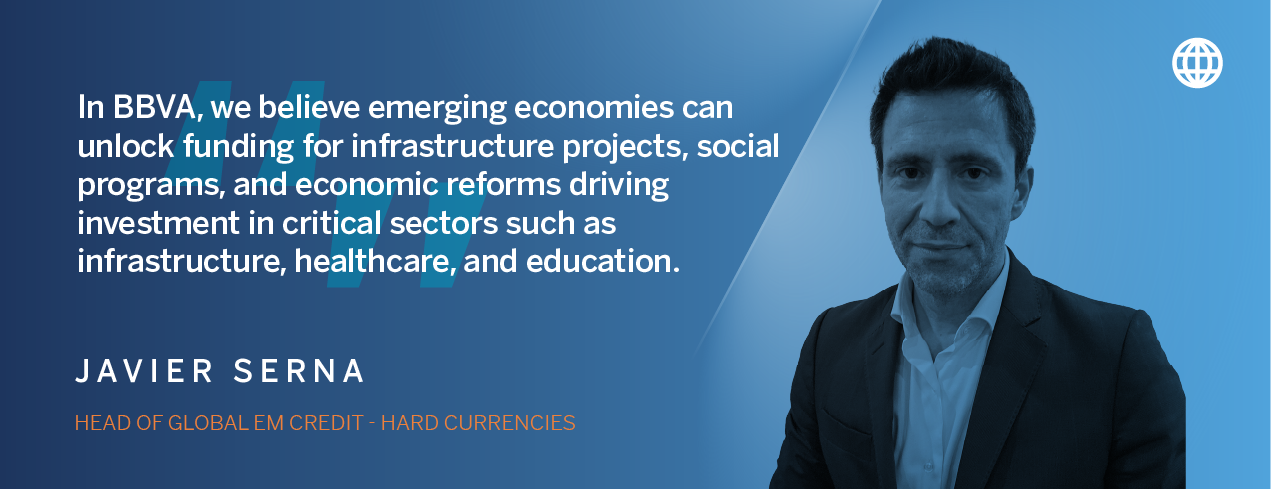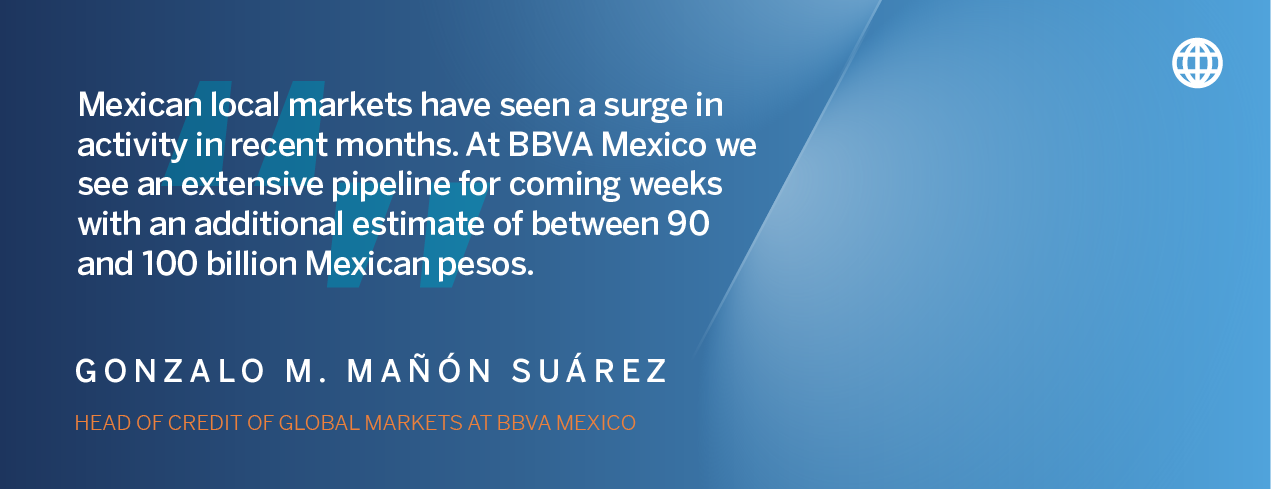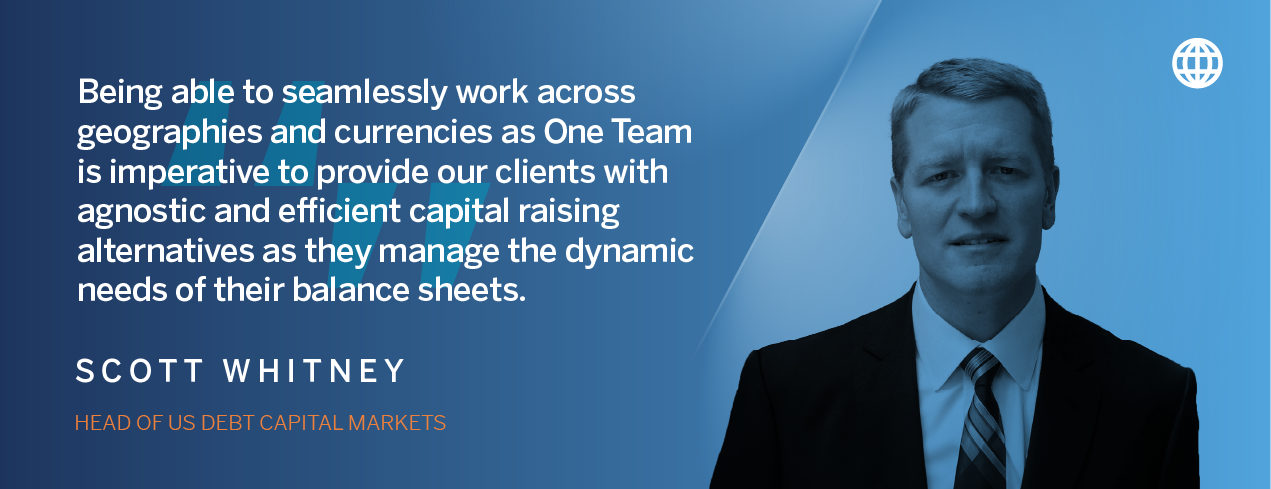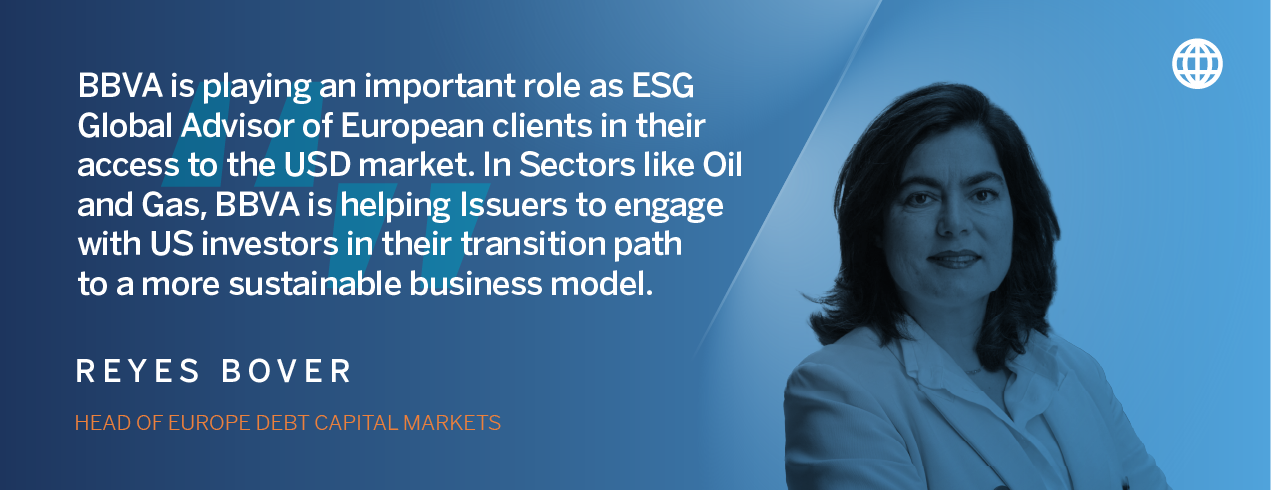
20 March 2024
Cross-border financing: a dynamic source of capital for corporate investment
Cross-border bonds are key instruments for optimizing companies' capital structure, diversifying their sources of funding and reducing the costs associated with financing. In a context of high interest rates and volatile markets, their popularity has increased considerably. Therefore, from BBVA CIB, we provide a brief analysis, told by our experts, on why the fixed income markets are a financing instrument in the global capital markets.
In the last month, there have been over 2M public mentions related to cross-border financing as a funding tool for companies. In our latest LinkedIn Trending Data newsletter, we have cross-referenced this data with more than 670K mentions linked to #CreditRisk and more than 1.1M to #FinancingCosts, #ExchangeRateRiskt and #Diversification to bring you a brief analysis on why fixed income markets are a financing instrument in global capital markets.
Fixed income markets have been the focus of attention for some months now, both because of their less volatile nature in uncertain markets such as the current one, and because of their attractiveness as a financing instrument in global capital markets. In a context in which macroeconomic events blur their borders and impact with different intensity levels in several parts of the world, the ability to benefit from the effects of these events requires a rigorous vision and knowledge of global markets.
As a financial instrument for raising capital, bond issues present, in the current scenario, a number of advantages that are not going unnoticed by issuers and investors alike.
In the words of and expert
A dynamic market that requires global capabilities to detect and capture opportunities
The relevance of the issuer role of emerging markets - by Javier Serna Head of Global EM Credit - Hard Currencies at BBVA

At present, emerging markets stand at a crucial juncture, seeking policies to fuel growth and attract investments while navigating an uncertain economic and geopolitical environment. In this context, international bond markets emerge as a powerful financing tool, offering emerging economies access to vital capital.
Accessing international bond markets can help emerging market issuers to diversify their sources of financing and thus reduce reliance on domestic banks or volatile capital inflows and currency risk. From an investor perspective, international bonds issued by emerging market institutions typically offer attractive returns compared to bonds from more established markets.
Accessing international bond markets can help emerging market issuers to diversify their sources of financing and thus reduce reliance on domestic banks.
In this sense, Turkey has become a leading example. In 2023, increasing concerns about the evolution of the Turkish economy led to certain periods of broad financial instability, a sharp increase in funding rates and a decline in foreign reserves. However, with the implementation of more orthodox economic and monetary policies, Turkey's public and private issuers have been able to launch several high profile, new issue bond transactions in international markets attracting the interest of global institutional investors. As a result, funding costs have now declined and the economic recovery is underway, a process in which BBVA CIB has contributed as a bookrunner in four bond transactions in 2024 YTD.
In BBVA, we believe emerging economies can unlock funding for infrastructure projects, social programs, and economic reforms driving investment in critical sectors such as infrastructure, healthcare, and education. This really represents the path for sustainable growth which is an essential pillar in our strategy.
México, a booming market - by Gonzalo Manuel Mañon Suarez, Head of Credit Markets México at BBVA

Mexican local markets have seen a surge in activity in recent months, (as of March 8th, some MXN 100 billion have been issued on 22 bond offerings). At BBVA Mexico we see an extensive pipeline for coming weeks, on an additional estimate of MXN 90-100 billion, to be placed before the election period, to take place in June this year, where Presidential, Congress as well as Municipal elections will be held.
Cross-Border deals such as AMX MXN 20bn Global Peso Note were issued, fostering a mix of local and international demand for Mexican Peso assets.
A broader view, key to raising capital - by Scott Whitney, Head of US Debt Capital Markets

Operating primarily in the US market, which over the past several years has executed in excess of $1.2 trillion of annual investment grade volume, many of our clients remain satisfied with the cost of capital and liquidity provided through domestic USD market alternatives. However, a growing and meaningful portion of our clients are continuously seeking out ways to optimize their capital structure, diversify their funding sources and opportunistically lower their funding costs. The traditional evolution for these clients is to expand into the European Capital Markets.
Given our Developed Market Credit platform across Sales, Trading, Syndicate and Origination teams around the globe, we are able to advise clients on the currencies and products available across all fixed income markets. Additionally, with BBVA's strengths in other core geographies, such as Mexico and Turkey, it allows our teams to provide capital raising alternatives, which are oftentimes creative bespoke ideas not seen previously.
Being able to seamlessly work across geographies and currencies as One Team is imperative to provide our clients with agnostic and efficient capital raising alternatives as they manage the dynamic needs of their balance sheets.
Yankee bonds, playing a growing role in the European Issuers’ bond financing - by Reyes Bover, Head of Europe Debt Capital Markets

European issuers' access to USD bonds markets (through the so-called Yankee bonds) has recently grown, driven by the strength of demand from US investors, avid to capture current yields in anticipation of closer Fed's rates cuts.
Reasons to enter the USD market are diverse: size and investors diversification as the main ones, followed by natural balance sheets' currency needs. Most intensive sectors in funding needs- such as Autos and Energy- are amongst the most active USD Issuers.
BBVA as Issuer is also building a more recurrent presence in the USD market across different products. BBVAs DCM activity as Bookrunner of USD Yankee Bonds has grown over the last years, as part of a global financing offer to our European Corporate Clients. Our New York based US Credit platform is accompanying that growth, with specialist resources in DCM, Syndicate, Sales and Trading.
BBVA as Issuer is also building a more recurrent presence in the USD market across different products.
In the Auto sector BBVA has successfully led USD multi-tranche issues for Daimler-Trucks, Mercedes-Benz and Volskswagen. Also, BBVA is playing an important role as ESG Global Advisor of European clients in their access to the USD market. In Sectors like Oil and Gas, BBVA is helping Issuers to engage with US investors in their transition path to a more sustainable business model, addressing investors' main ESG concerns and leveraging on our solid ESG expertise in this regard in Europe. The recent BP $2.25 Bn 5 & 10 year bond joint-led by BBVA is a good testimony of that.
The Sterling market also stands as another important diversification market for European and non-UK Issuers, particularly for longer tenors and at times of higher volatility of the Euro-denominated bond market. BBVA's expansion into Sterling strengthens our position as a key player in global financing, being able to offer options in a variety of core currencies. On the investor side, we have strong relationships with a number of the UK Life Insurers who are seeking Sterling credit in 10-30 years to support a large increase in UK Bulk Pension Annuity Transactions. BBVA arranged Sterling Senior and Covered bonds for Lloyds, Nationwide, Skipton and Coventry Building Societies, as well as Subordinated for Phoenix Insurance Group.




